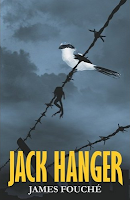I'm going to use the terms upside and downside in this review. Upside is our world. Downside is the shadow world.
The Ward follows the authors' first book, The Mall (review here). The Ward is set in a poor public hospital in Johannesburg and not long after the events of The Mall. There are several small crossovers between the two books and I recommend reading The Mall first. It takes place in that ubiquitous temple of communal worship dedicated to all things commercial, the urban mall. What they do with it is both humorous and horrifying.
Josh returns to consciousness after two days, blind, in New Hope hospital in Johannesburg, South Africa. He learns that he collapsed at work with a severe case of measles. Almost a greater shock than his medical condition is where he is. His medical aid should have him in a first rate hospital, not No Hope as it is popularly called. Lisa is on the same ward. Unable to get any more plastic surgery in Durban, Lisa has conned her way into New Hope in her search for physical perfection. Both are in New Hope for reasons out of their control and when they find themselves in the downside Wards, the horror begins.
The first third takes place in New Hope/No Hope hospital and it paints a grim picture of public healthcare. Lack of cleanliness, bad attitudes, and scarcity of health-care staff have figured into reports on the state of public hospitals in South Africa this year. It is no wonder that the authors have Josh horrified to learn that he is in a public hospital instead of the private facilities his medical aide should be paying for. The downside wards demonstrate a different view of health care. Let's just say that it's commodity based.
With The Mall and now The Ward, S.L. Grey (Sarah Lotz and Louis Greenberg) are exploring a form of horror somewhere between Jackson/James and Smith mentioned above. Because I'm a librarian and think in categories, I decided the books dealt with horror of the variety perversion of the familiar or the perversion of safe places.
I asked the authors how they see their books. Sarah said she would "nick China Miéville's term 'weird fiction'** as a category for the Downside books, as I'm not sure they fit fit under the 'horror' umbrella completely or what the term really means any more." 'Weird fiction' is a good description for their books. Wikipedia has an article on it, naturally. If you do a search on china mieville weird fiction I think you'll agree with Sarah.
Louis confirmed that I was on the right track:
We did deliberately set out to take everyday (and often boring, mundane) reality like shopping malls and add a frightening twist to it...If something looks just about real, but there's just something off about it, we both think that's more frightening than something completely fantastic....We wanted to put real, everyday people in weird situations and really try to ge our reders to imagine how they'd react if that implausible stuff were really happening to them.The Mall and The Ward are set in places that represent pleasure, comfort, and safety, and use those locations also to examine political and social issues while at the same time giving the reader a cracking good read and scare. The Mall It takes place in that ubiquitous temple of communal worship dedicated to all things commercial, the urban mall. What they do with it is both humorous and horrifying. The Ward focuses on health care, with disparity in care as a subtext and does it in a darker and, I think, more cynical way. Louis said that they "deliberately set out to satirise certain injustices that are ripe for satirising in society. They seemed a good background for our novels, but it's the characters and situations that are in the foreground. The books are primarily for fun.""
The Ward advances our knowledge of the downside world and we see more of the Administration, those who run downside. I think the authors had a bit of fun creating a new bizarro-world bureaucracy. We also learn that downside interacts with the upside more than we expected from events in The Mall.
The Ward and The Mall are a fun, intelligent, read with a good blend of character, setting, humour, satire, and social commentary. They have a flavour of South Africa which adds a little spice for non-South Africans and probably gives the South African readers an "oh yea, I've been there" feeling. I love the "secret world" trope and the Downside series is one of the best. The third volume is in the works and I'm eagerly looking forward to seeing what aspect of Downside will be explored next.
As of this review you will have to purchase a copy of The Ward from Amazon UK. If you live in the UK you can get it also through Book Depository which will not ship it to the US at this time.
*I borrowed this from shmoop.com. They have a nice 4 paragraph "in a nutshell" essay on The Turn of the Screw.
**Wikipedia article on weird fiction.



